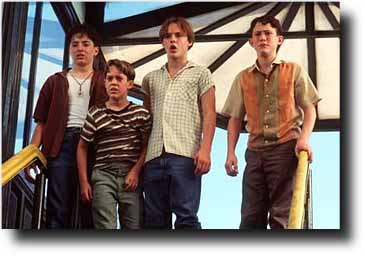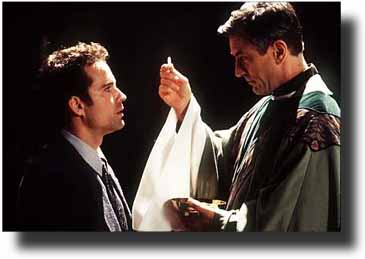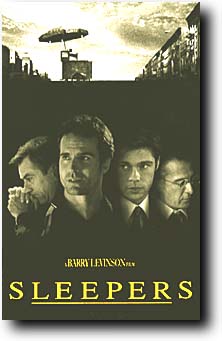






















|

|
The early scenes with the boys are indeed intoxicating, creating a
magnificent time period, like the one recalled in The Boys of
Summer or The Pope of Greenwich Village where thereís always a
game of stickball to play, always an open fire hydrant gushing water on
exuberant youngsters, always time for sunbathing on the roof or leaping
off the wharf into the bay (back when you could actually swim in the
Hudson River), and where thereís always a fat, lazy summer wind carrying a
doo-wop melody.
|

The boys watch in horror in Sleepers.
(©1996 Warner Brothers) |

These scenes are carefully crafted to pull us into the story and
intoxicate us so we wonít mind getting manipulated later (which the movie
actually does right from its start but it's so well crafted itís hard to
complain). The movie gives us four eternally exuberant youngsters who
become models of American youth, even while they run money for the mob. But their
exuberance also makes them believe in their own invulnerability, that they
can do anything and get away with it. And so they rob a hot dog vendor,
run off with this cart, and accidentally-on-purpose send it crashing down
some subway steps.
The scenes with the boys take up the first 45 minutes of the movie.
Of the movieís big name marquee stars, only Robert DeNiro and Kevin Bacon appear during
this time. DeNiro plays Father Bobby, a priest at the local Catholic church where the boys
serve as altar boys. And Bacon plays a reformatory guard named Nokes. While DeNiro's role is relatively low key, Bacon's role places him in the spotlight, creating a despicable, purely evil character who delights in torture and sexual abuse.
After the boys serve their time, the movie leaps from 1968 to 1981 and shows us the boys all grown up. The abuse hangs with them, but they don't talk about it. Two of the boys have careers, one a writer (played by Jason Patric, who also serves as the narrator) and the other a lawyer (Brad Pitt) in the District Attorney's office. However, the other two boys have become street thugs (Ron Eldard and Billy Crudup). One night Eldard and Crudup stumble into a bar and find Nokes sitting at a table, eating his dinner. Initially, they're stunned, but then they pull out their guns and fill him with lead.
|

Jason Patric and Robert DeNiro in
Sleepers. (©1996 Warner Brothers) |

Pitt then steps forward with a plan to finish the revenge against the other guards involved in the abuse. During this time, the movie adopts a somber, humorless
approach that emphasizes the emptiness in the boys' lives. In the process,
the characters become cold and distant and impossible to warm up to. And
that is no doubt Levinson's intention--to show us the emotional wreckage
caused by the sexual abuse--but the characters displayed on screen then
become vague and insubstantial. The courtroom drama
overpowers the characters, but Pitt's scheme contains few surprises as it slowly and inexorably plods forward,
toward a rigged conclusion. We even get a
trial witness breaking down and revealing everything, just like on Perry Mason.
However, with DeNiro, Pitt,
Patric and Dustin Hoffman (as an alcoholic lawyer) on hand, the
movie always feels like an event, as if anything can happen--even when the
movie is stumbling through relatively routine courtroom drama. Almost any
episode of TV's Law and Order gives us more intriguing developments
in the courtroom.
But much of the failure of Sleepers comes from the romanticized attitude toward the characters. The filmmakers clearly want us to like Pitt, Patric, Crudup, and Eldard. When they're together, the music swells and the camera drifts into soft focus, idealizing them and blaming all the problems in their lives on the sexual abuse. Crudup and Eldard might look like gutter trash (and they've killed over half a dozen people between them), but in the eyes of the filmmakers, they're fallen angels and not responsible for their behavior.
Sleepers is further evidence of Barry Levinsonís great facility
for creating magnificent, atmospheric evocations of Americaís past;
however, a romantic approach tends to force feed the audience the moral
issues without communicating the complexities or ambiguities.

 A Warner Brothers
Presentation A Warner Brothers
Presentation |  |
|
|



















